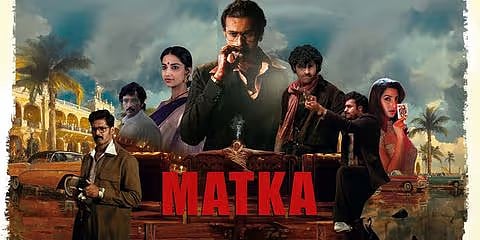

Matka, the upcoming crime-drama, may not be the first time Varun Tej is playing a character with grey shades—he did earlier in Gaddalakonda Ganesh as well—but it’s far more challenging in other ways, the actor states. Directed by Karuna Kumar, Matka tells the story of Vasu, a coolie who rises to become a major figure in the world of crime as he becomes the Matka overlord. While the character is fictional, Vasu is loosely based on Ratan Khatri, an immigrant from Pakistan who earned the title of Matka king in Bombay in the 1960s.
This is the first time Varun Tej is playing a role with such a long character arc—as Vasu moves up the ladder over a period of 24 years. With the narrative of Matka ranging from 1958 to 1982, the Fidaa actor had a huge task at hand in terms of capturing the small nuances of an ageing man.
Talking about the challenges of capturing the evolving physicality of his character, Varun states, “Karuna sir and I had a few look references as a starting point. When Vasu turns 50, we knew we had to give him a clean shave and moustache look. But there were no reference points for how to portray such a character. You merely begin to observe more people around you.”
Varun Tej recalls being careful not to go overboard while trying to capture the physical transformation of Vasu over all these years. He states, “It’s a 25-year journey, so differences should be seen, but you cannot play the character entirely differently—that’s the tricky part. His body language needs to progress with age and be gradually polished, be in terms of how he walks or sits. It’s all mental homework.”
Varun Tej explains how the process of understanding the grey-shaded character evolved as he spent more time reading the script. He reflects, “After we agreed to do the film, I spent a lot of time with the director, Karuna Kumar. Later, when Karuna sir went into pre-production, I stayed at home and read the script multiple times.
That helps for a large part.” Varun places a lot of importance on multiple, endless readings of scripts for a specific reason. He explains, “On paper, when you are reading the scene, you subconsciously begin to explore how a character’s body language and behaviour will be.
How he will sit, how he will smoke his beedi, how his body language and attitude will be while bashing someone. You begin to create your own picture and build a structure in your head. Later, when you meet the director, you share your ideas, have a discussion, and come back with his notes.”
In Matka, Vasu is a refugee from Burma who moves to Vizag to earn a living and gradually fits into the milieu. Varun Tej mentions that there was no categorical need for Vasu to have a Vizag accent in these portions, considering his immigrant background. “However, as he grows more accustomed to the new place and culture, Vasu’s thick accent decreases gradually and comes closer to a normal Telugu accent.”
Varun Tej recalls the contribution of other creative aspects like production design that help in this aspect of performance. Pointing to the throne-like chair he is sitting on, which is incidentally the same chair used in the film, Varun adds, “When Vasu sits on this chair the first time, at a time when he does not have any money or power, he is enamoured by the royalty and grandeur of it. All these little things help.”
The Matka star adds that aspects like talking to other actors and reading lines with them often add to the performance as well. “There is always a scope for improvement with how they respond to the lines,” he notes.
Throughout the interaction, Varun Tej emphasises how the audience will find themselves journeying with the character instead of trying to see him as good or bad.
Recalling other popular films like Pushpa: The Rise and the recently released Lucky Baskhar, which have grey-shaded protagonists, Varun Tej says, “That’s our intention too, to make you travel with the character, irrespective of his deeds—abuse him, love him, root for him, want him to beat up the baddies. At some point, you will see yourself in him. If you don’t connect, there is no impact, no cinema.” At the same time, Varun Tej asserts that there is no glorification of crime in Matka. “It’s not like we are indulging in the glorification of bad characters. We believe we have maintained a fine balance,” he concludes.